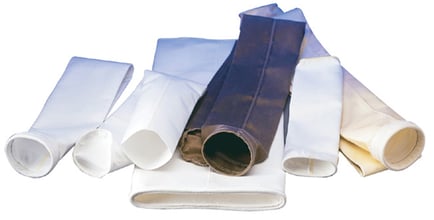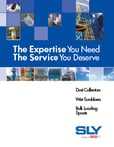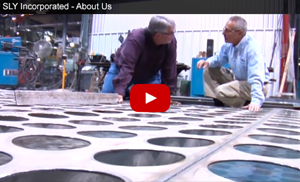If you have a baghouse, your filter bag can make or break the performance and efficiency of your dust collection system. When filter bags fail, it can cause avoidable downtime and force you to get costly bag replacements – all of which can have a major impact on your bottom line.
That is why you want to mitigate filter bag failure as much as possible. Filter bag replacements are typically the biggest operating expenses for a baghouse system, so you can get the biggest return on your investment if you can extend the life of your filter bag. But it’s not just about cost-minimizing filter bag failure will lead to:
- Safer facilities
- Easier regulatory compliance
- Streamlined maintenance
- Enhanced system efficiency/performance

What are the Causes of Filter Bag Failure?
Filter bag failure can occur for a variety of reasons. Fortunately, many of these reasons are well documented, with steps that you can take to prevent them. Here are the main causes of filter bag failure, as well as how to combat them:
Uncontrolled Moisture
Typical baghouses and filter bags are not designed for wet environments. If you have uncontrolled moisture, it can cause your filter media to plug up and your filter bags to fail prematurely. Moisture will also cause dust to accumulate on other parts of the collector as well, including the inner walls, ductwork, pressure sensors, and the vanes of the hopper's rotary airlock valve, which can cause the airlock to seize.
It only takes a small amount of moisture to lead to a big problem. Common causes of moisture within your baghouse include:
- Condensation
- Changes in humidity/temperature
- Hygroscopic dusts (salts, sugar, metal oxides, etc.)
- Moisture entering the collector through leaks or bad seals
- Wet or fouled compressed air supply
Fix: Use a Dryer or Separator
Since wet/oily air is often the problem, you can use a dryer to remove moisture from the air if it’s wet, or use a separator to remove oily particulate. Choosing different filter media can also help, as filters made from common synthetic materials more easily break down when exposed to acidic or basic solutions caused by moisture combining with contaminants in the collector.
Overcleaning
While it’s required that you clean your filter bags, too much cleaning can cause your bags to fail early. When you pulse the bags more often than they need to be pulsed, it can lead to small tears in the bag that progressively become a bigger and bigger problem. This can also happen if you pulse the filter bags at too high a pressure, like going up to 110 psi when it should only be 80 psi.
Manual cleaning is often not recommended in general as it can easily lead to these tears and quickly break down the filter bag. If your filter bag is too plugged up for pulsing to work, it’s best to just change out the bags.
Fix: Fine-Tune Your Cleaning System
A healthy dry dust collection system should have a steady pressure drop. If it does not, you need to decrease (or potentially increase) the frequency of your cleaning. Work with an air quality control expert to fine-tune your cleaning system by adjusting your pulse control timer to get your desired pressure drop.
Another option is to add clean-on-demand instrumentation so that it only cleans when the pressure drop gets to a certain point, which would be defined by your specific system and application.
Abrasive Dust
Just like how improper cleaning methods can cause tears in your filter bags, so can abrasive dust. While certain dusts will be more naturally abrasive, the design of the collector itself can also cause increased friction between the dust and the filter bag. Poor inlet design, too high of an air-to-cloth ratio, and too high of an interstitial velocity will all lead to more abrasive dust-to-bag contact.
Fix: Use Abrasion-Resistant Designs
In addition to designing your collector to reduce the upward velocity between the filter bag and your dust, you can use an AR (abrasion-resistant) plate for the inlet of your collector.
Poor Filter Bag Fit
For maximum filter bag life, you want a good filter bag to cage fit. You need the right amount of flex – too rigid and the bag won’t be flexible enough, while too much flex will lead to an excessive amount of momentum when the material hits the cage. Having too few vertical wires in the cage can also have a similar effect.
Poor filter bag fit can also cause your cleaning process to underperform and not clean your filter bags well, which adds to the problem of overcleaning your bags as you try to make up for the loss by cleaning more regularly.
Fix: Better Fits and More Wires
To ensure a proper fit, make sure that a dust collection expert is at the helm of designing your bag/collection system and that you fit the bag appropriately during installation. Having a cage with more wires can also lead to better support, making for easier cleaning and less wear on the filter bag.
Preventing Filter Bag Failure: It all Starts with the Design
Prevention is always the best form of maintenance. The best way to prolong filter bag life is to design the collector correctly from the get-go.
Here at Sly, we always make sure to design your dust collector system with filter bag life in mind. Our experts will ask questions upfront about your application and all of the different potential modes of filter bag failure. If there’s ever any uncertainty, we can conduct a filter bag analysis to determine exactly what the problem is and how to prevent it.
Once we get your custom dust collector installed, we can help find the right maintenance and upkeep protocols to ensure optimal bag life. By monitoring things like pressure drops, we can catch any minor issues before they become a bigger problem.
Contact us today to learn more about how Sly can help optimize your dust collection system for years to come with our total dust management approach to air quality control.
Tags: air filter, dust filters, fabric filters, filter cleaning, bag filter cleaning



